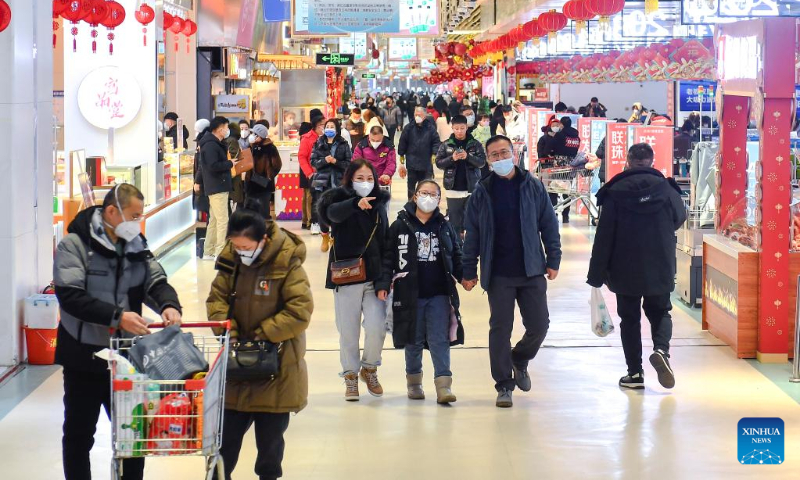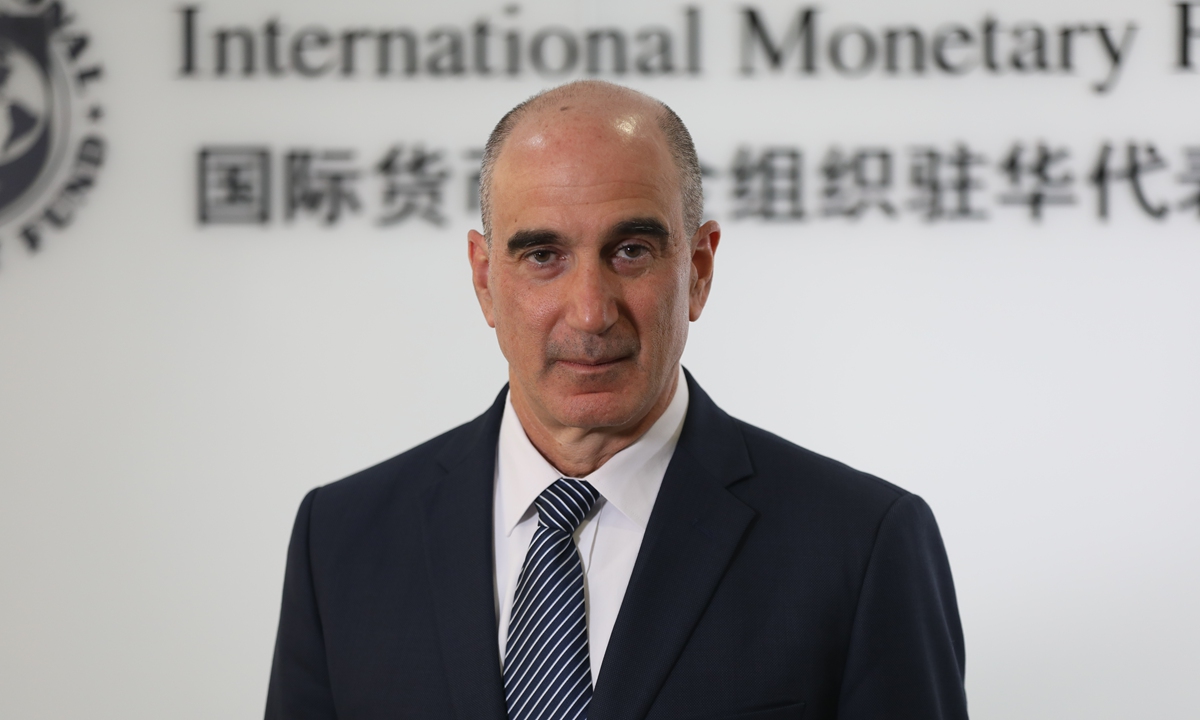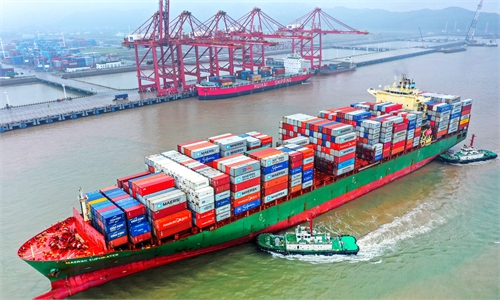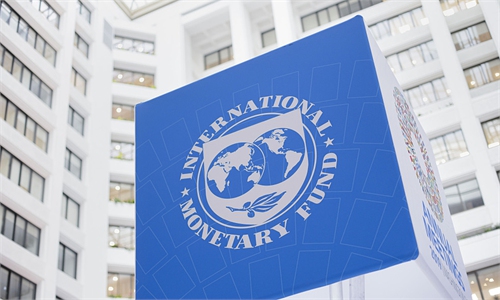Home consumption expected to drive China's economic recovery, which is likely to grow 5.2% this year: IMF official

People shop at a shopping mall in Changchun, northeast China's Jilin Province, Jan. 23, 2023. (Xinhua/Xu Chang)


Steven Alan Barnett, senior resident representative in China of the IMF Photo: Courtesy of IMF Office in China
Editor's Note:
On January 8, China downgraded pandemic management from category A to category B. The optimization of anti-COVID measures gave an immediate boost to economic activity. The International Monetary Fund (IMF) raised forecast for China's economic growth in 2023 to 5.2 percent from 4.4 percent in October. Global Times (GT) reporter Liu Yang conducted an interview with Steven Alan Barnett (Barnett), senior IMF resident representative in China, and the representative shared his views on the significance of China's economic revival this year, while calling for closer international cooperation in order to avoid the risk of fragmentation in the world economy.
GT: The IMF's previous forecast for China's GDP growth this year was 4.4 percent, before being revised upward to 5.2 percent. What is behind the raise?
Barnett: We revised our forecast for growth this year to 5.2 percent. This is up from 3.0 percent growth last year, and as you note, an upward revision from our previous forecast.
The key reason is the exit from the Dynamic Zero-COVID policy late last year. This has set the stage for a considerable improvement in economic activity. Thus, we expect activity to rebound throughout this year, especially household consumption which was subdued during 2022.
The outlook, however, is subject to higher-than-usual uncertainty. The key risks are related to the uncertain path of the pandemic, lingering challenges in the property sector, and the weak global growth outlook. On global growth, we forecast it to decline from 3.4 percent last year to 2.9 percent this year. We also assess that the balance of risks for global growth are tilted to the downside.
GT: The IMF suggested in recent briefing that China's economic growth this year will be driven by consumption rather than investment, what is the basis for this judgment? What do you expect China's consumption growth rate to be this year?
Barnett: A key reason for the rebound in growth this year will be in increase in consumer spending. Last year, household spending on dining out, domestic tourism, and recreation was held back as a result of the pandemic. With the lifting of the Dynamic Zero-COVID policy late last year and the subsiding COVID wave, we expect household spending to rebound.
We project that household consumption will contribute about 50 percent of GDP growth this year. This is a welcome development. Beyond the cyclical increase, we recommend reforms that would enable consumption to increasingly drive growth in the years ahead. This would be good for households in China, who benefit from more consumption. It would also make a significant contribution to achieving China's climate goals. As the economy pivots toward consumption, it also becomes greener. In short, consumption is less polluting than investment.
GT: How do you gauge the trend of China's real estate market this year?
Barnett: The real estate sector plays a large role in China's economy and financial system. It accounts for about one-fifth of GDP and is important for household balance sheets and local government coffers. For several years, the market was out of balance with supply running ahead of demand and, at the same time, housing was too expensive for many people to afford. In response, the government intensified policy steps to restore balance and reduce leverage in the past few years.
The challenge is to continue to bring the housing market back in balance, while, at the same time, preventing a disorderly adjustment. The latter would require dealing with problems related to financial stress in some developers and completing the stock of sold but unfinished housing. Recently, the government has taken welcome steps to reduce these problems — such as support for funding to complete pre-sold housing projects. Continued efforts would help ensure that the risks in property market are fully contained and that, over the medium term, the housing market is more balanced and of a sustainable size.
GT: What is your personal experience of the speed of China's economic recovery since the optimization of China's anti-COVID policy in December?
Barnett: I can feel and see the change in my day-to-day life. It is nice to see the restaurants crowded, people walking around town, and the malls packed. Even the return of Beijing's rush-hour traffic jams are a sign of how quickly the economy is rebounding. Many of my friends and colleagues are also again traveling — both within China and abroad, and for both work and pleasure. This is one illustration of the pent-up consumer and business demand that will propel activity in the near term.
GT: You have extensive research experience in the Asian economy, and you said in last year's report "Phoenix Financial Forum For The Greater Bay Area 2022 - New Prospects Amid Changes", stressing that fragmentation is bad for the world economy. The US has been putting pressure on China in the technology sector recently, how do you assess the impact of the US moves?
Barnett: The US and China together are a large share of the global economy, more than 40 percent at market exchange rates. Working together, the US and China could also make significant headway in addressing the most pressing global challenges.
More broadly, the world economy is at a much greater risk of fragmentation. A fragmentation that could undo decades of progress from economic integration. This risk must be avoided and replaced with a renewed spirit of international cooperation. In the economic sphere, three priorities for cooperation are trade, debt and climate action.
On trade, priorities are to roll back the distortionary subsidies and trade restrictions imposed in recent years; and strengthen the World Trade Organization (WTO), including new market-opening agreements. In addition, countries should carefully weigh the costs, at home and abroad, of "national security" measures on trade and investment.
On debt, vulnerable countries need the help of the global community. We have seen progress in this area, including agreement on the G20 Common Framework for Debt Treatment. Making the process more certain and faster would serve the interest of both creditors and debtors.
Last but not least, is collective action to address the climate crisis. More is needed to speed the green transition, including countries swiftly implementing mitigation policies, international coordination on carbon pricing or equivalent policies, and global cooperation to build resilience.
GT: At a recent event, Thomas Helbling said China's economy faces significant spillover effects this year, how much do you think it will contribute to world's growth? In which sectors will China's economic growth boost other countries' economies?
Barnett: China's rebound in 2023 provides a welcome and needed lift to the global economy. Given China's large size and the projected rebound, China will contribute considerably to global growth.
In addition to directly contributing to global growth, China generates spillovers to other economies. When China grows faster it imports more from other countries. This benefits China's trading partners. We estimate 1 percentage point more growth in China fuels 0.3 percentage points of growth elsewhere. This was the average impact, countries that have closer trade links to China would benefit more.
This illustrates how strong growth in China over the medium term is good both for China and the world economy.
GT: China has resumed outbound group tour operations as of February 6. When do you think China's outbound travel will rebound and exceed the levels seen before the pandemic?
Barnett: This relates to the question above on China's growth spillovers. Increased tourism from China is one way that the recovery in China can benefit other economies, especially those with large tourism sectors. A Chinese tourist spending money on a vacation to Thailand is recorded as a tourism services import in China (and export in Thailand).
Outbound tourism was sharply curtailed during the pandemic. Thus, a resumption of tourism could provide a welcome lift to other economies. To provide some numbers: in 2019, outbound tourism—which also includes overseas education spending — was US$255 billion. It dropped substantially in 2021 to US$105 billion. So, a return to the 2019 levels would mean a boost of around US$150 billion in outbound tourism from China.
GT: What do you think of a recent viewpoint that China's reopening will cause inflation in the world?
Barnett: This is not our baseline forecast.
First, we forecast inflation in China this year to remain modest. Specifically, we expect average inflation in China this year to be around 2 percent. China's economy has a negative output gap — meaning China can produce more than is currently demanded. Thus, as demand recovers this year, China can ramp up production without putting upward pressure on prices. China's labor markets are relatively flexible, which helps reduce inflationary pressure as demand picks up.
Second, regarding global inflation, we expect it to steadily decline. After reaching 8.8 percent last year, we forecast global inflation (annual average) to decline to 6.6 percent this year and 4.3 percent in 2024. Central banks around the world have tightened monetary policy to tame inflation, which is the main reason we forecast global inflation to steadily drop. This forecast, importantly, already includes the impact of the strong rebound in China's growth this year.
Finally, the nature of the recovery in China is also relevant. We forecast the recovery in growth to be led by household consumption. This is less likely to put upward pressure on commodity prices than a recovery led by investment, which is more commodity intensive. Thus, compared to past episodes in China—where investment fueled a recovery—this recovery is expected to have less pressure on commodity prices.


